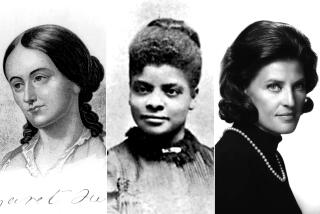Underestimated, and Fearless
- Share via
For most of her life, her family, her peers and her competitors underestimated Katharine Graham. Never an outspoken feminist, she was nevertheless a trailblazer as publisher and eventually CEO of the Washington Post, positions that fell to her unexpectedly after her husband, Philip Graham, committed suicide in 1963. Early doubters of Graham, who died Tuesday after a bad fall at age 84, were legion.
Graham, then 46, didn’t just lack a journalistic background; she had no work experience at all. No matter. She performed brilliantly, transforming the Post from a provincial daily into a national power and a sprawling media enterprise.
Her rise coincided with Washington’s emergence as a cosmopolitan and world capital. The first major test of her tenacity came in 1971, when she defied threats of federal prosecution and published the Pentagon Papers in the Post.
Her finest hour came during Watergate. Atty. Gen. John Mitchell warned in 1972 that “Katie Graham” was going to find her “tit caught in a big fat wringer” if news articles tied him to Watergate. Graham did not flinch. She stood by Editor Ben Bradlee and two young reporters, Bob Woodward and Carl Bernstein.
Graham also wielded immense influence and power as Washington’s preeminent hostess. Here, too, she was a pioneer; in the 1960s, when it was customary for women and men to separate after dinner, she refused. If cigars were going to be smoked and gossip exchanged, Graham was going to be there.
Near the end of her career, Graham delivered one last surprise--an honest, searing memoir called “Personal History.” It won a Pulitzer Prize. Graham, against the odds, triumphed again.


